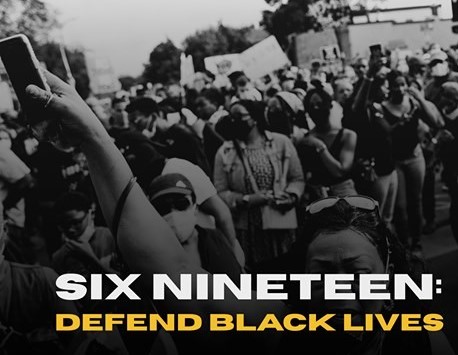The Movement for Black Lives (M4BL) has called all of us to action June 19-21 at this potentially pivotal moment in U.S. history:
Juneteenth is a day that honors Black freedom and Black resistance, and centers Black people’s unique contribution to the struggle for justice in the U.S. This Juneteenth is a rare moment for our communities to proclaim in one voice that Black Lives Matter, and that we won’t tolerate anything less than justice for all our people.”
The M4BL call is resonating as never before because of the uprising that has swept the country since the murder of George Floyd.
This upsurge has already led to one of the largest and most rapid shifts in public opinion on any issue in U.S. history. Two-thirds of the U.S people now express support for the Black Lives Matter movement; in just the last two weeks, the movement’s support grew as much as it had in the previous two years.
The scale and diversity of people protesting is unprecedented (and especially remarkable because the actions are taking place amid a pandemic). Demonstrations have been held in over 2,000 cities and towns in all 50 states and U.S. occupied territories. With young African Americans in the lead, people of all racial backgrounds and all ages have taken to the streets.
The movement has already changed the national conversation and thrust the deep-rooted problem of anti-Blackness center stage. In a very short time it has won a number of concrete victories.
Three demands, seven principles
Even the most militant and widely supported upheaval fades sooner or later. The challenge is to harness and focus its energy to win the biggest systemic victories possible and to build the consciousness and organization necessary to retain momentum through ups and downs.
The Movement for Black Lives’ call for Six Nineteen addresses the next step in that process. It offers a set of three clear demands to anchor the struggle over the next phase:
- Defund the Police
- Invest in Black Communities
- Call for the Resignation of Donald Trump
Going further, the effort advances a set of seven principles that can serve racial justice and all radical movements well over the long haul. For instance:
“Respect Black Leadership: This is a moment during which people from all racial and ethnic backgrounds are putting Black lives at the center of the conversation. We encourage that. Putting Black lives at the center also means respecting Black communities and long-standing Black leadership that have worked for justice in various communities for many years. Respecting Black leadership doesn’t mean always deferring to Black folks. It does mean listening to Black folks, supporting Black folks, and on a weekend like Juneteenth, being a respectful guest in our sacred space.”
And:
“Find Your Lane: Freedom is for everyone and will require all of us to win. Whatever you do, do it for justice. There is no one “right” way to protest. We will need art, and chants, and marches, and direct action, and electoral justice. This is an “all hands” moment.”
In the short time since M4BL started organizing for Juneteenth the actions have already gained significant support. Almost 100 organizations ranging from Color of Change and the Center for Constitutional Rights to the New Georgia Project and The Rising Majority have signed on as partners in mobilizing for the weekend.
Functioning in a sharply polarized country, amid a racial justice crisis, a public health crisis, an economic crisis, and a climate change crisis, it is not possible to predict the exact contours of what lies ahead. The stages of struggle that follow this one will present numerous challenges. We will be in the strongest position to meet them if we maximize the impact of Six Nineteen.
Lessons for the last time around
This is not the first time that a rebellion in the streets has put this country’s “race problem” at the top of the national agenda. It last happened just 50 years ago, and it is sobering to remember the result.
In March 1968, the National Advisory Commission on Civil Disorders, appointed by President Lyndon Johnson to analyze the urban uprisings that had shaken the country between 1964 and 1967 released its official report. The report’s key conclusions and recommendations were:
“White racism is essentially responsible for the explosive mixture which has been accumulating in our cities since the end of World War II. White society is deeply implicated in the ghetto. White institutions created it, white institutions maintain it, and white society condones it.
“Our nation is moving toward two societies, one black, one white – separate and unequal.
“[To attain] equal opportunities for all within a common society will require a commitment to national action – compassionate, massive, and sustained, backed by the resources of the most powerful and the richest nation on this earth. From every American it will require new attitudes, new understanding, and, above all, new will.
“Massive new programs will require unprecedented levels of funding and performance, but they neither probe deeper nor demand more than the problems which called them forth. There can be no higher priority for national action and no higher claim on the nation’s conscience.”
The government response to this “no higher priority” mandate was to put the Commission report in a bottom drawer. The U.S. ruling elite as a whole, backed by the majority of white America, did gather its political will. But it was directed toward first halting and then rolling back the gains for racial justice and the many accompanying progressive reforms that had been won by the 1954-1973 grassroots upsurge galvanized by the Black-led Civil Rights Movement.
Forty-five years of backlash followed, reaching a crescendo with the ascent of white nationalism to executive power and all the nakedly anti-Black, anti-immigrant, Islamophobic, xenophobic, anti-worker, misogynist and homophobic/transphobic horrors that preceded the current uprising.
Take action to defend black lives
The bitter lesson is that even the most momentous uprising does not translate automatically into deep and durable positive change. But the good news is that our prospects for success are more promising this time around. There are four underlying reasons for this.
First, the country’s demographics have changed. In 1970 the U.S population was 83.5% “non-Hispanic white”; today it is only 60.4%.
Second, though this is still a very segregated country, it is not nearly as segregated as it was in the 1960s. Young people especially have grown up in more multi-racial settings and a much more multiracial culture. This fruit of the 1960s battles manifests itself in numerous ways, including the unprecedented diversity of young people turning taking the streets the last few weeks under the banner of Black Lives Matter.
Third, the core of our opposition, the U.S. ruling class, is weaker. The U.S. is no longer as dominant in the global economy as it was 50 years ago and is not coming off a long period of economic growth. The neoliberal economic model is in tatters. The elite is divided and without vision. Its “liberal” wing of the elite has no viable plan to put their system back together in the old way, and the command post of racist reaction, the Trump administration, has no tools beyond fear-mongering and naked force.
Last, as evident in the Six Nineteen actions’ demands and principles, the new generation of activists leading today’s battles have a more holistic and inclusive perspective than was dominant among the revolutionaries of 1968. M4BL and its closest allies exhibit a more fine-tuned sense of the balance of forces and long-haul nature of the struggle as well.
These factors give us a lot to build on. The next step is making the Juneteenth protests as large and powerful as possible.
You can find an action in your area or on-line here or sign up to host an event here.
Let’s act, unite, and promote the Six Nineteen demands.
Defend Black Lives.

